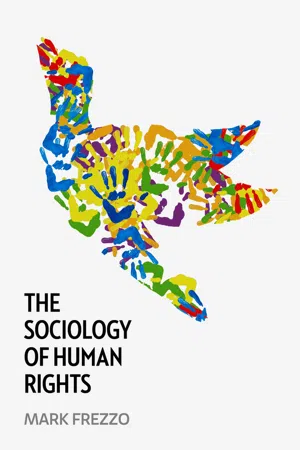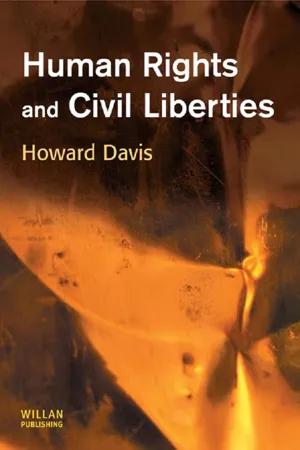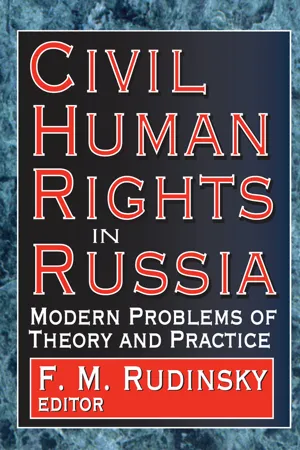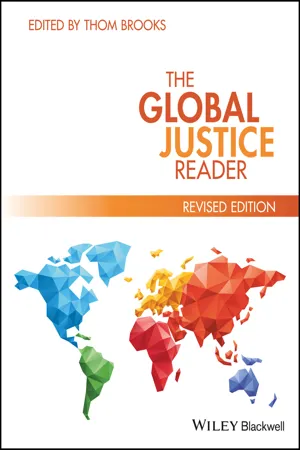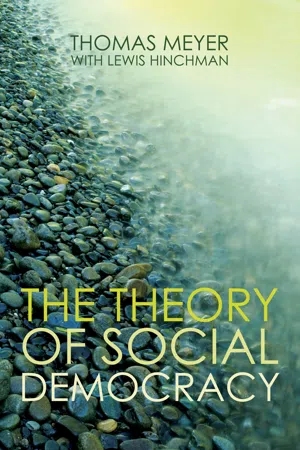Politics & International Relations
Civil Liberties vs Civil Rights
Civil liberties refer to the basic rights and freedoms that are guaranteed to individuals, such as freedom of speech and religion, and protection from government interference. Civil rights, on the other hand, are the rights that protect individuals from discrimination and ensure equal treatment under the law, such as the right to vote and the right to fair housing.
Written by Perlego with AI-assistance
Related key terms
7 Key excerpts on "Civil Liberties vs Civil Rights"
- eBook - ePub
- Mark Frezzo(Author)
- 2014(Publication Date)
- Polity(Publisher)
3 Civil and Political RightsAfter briefly reviewing the issue of how and why to classify human rights, this chapter explores the most widely accepted category of human rights (especially in the US and elsewhere in the Western world), namely the civil and political rights, proclaimed under the banner of liberty, that (a) protect human beings from abuses perpetrated not only by one another, but also by the state itself, (b) allow human beings to participate freely and fully in civil society and political life, and (c) permit human beings to explore and nurture their identities, interests, ideas, beliefs, and values without undue interference from political authorities. In a nutshell, civil and political rights involve not only checks on government power (enshrined in law and ensured by the court system), but also protections provided by the government that allow individuals to flourish in society. For this reason, civil and political rights are often treated as the most “important” rights, an understandable assumption that this book seeks, nonetheless, to challenge.Preliminary Questions about Civil and Political RightsAs we have seen in previous chapters, human rights are, by definition, relational. In other words, while it is useful for explanatory purposes to classify human rights in one way or another, it is equally important to recognize that different types of rights make sense only in relation to one another. Held by the UN in Vienna in 1993, the World Conference on Human Rights affirmed the connection between civil and political rights and other types of rights (http://www.ohchr.org/en/professionalinterest/pages/vienna.aspx - eBook - ePub
- Howard Davis(Author)
- 2013(Publication Date)
- Willan(Publisher)
16 Partly this is an argument leading to the kinds of conservative political assumptions outlined above. However, it is also the basis of more progressive criticism. Liberal perfectionism, for example, asserts that it is reasonable for the state to wish to restrict or denigrate certain pointless conditions of life, like drug addiction, for example, because they are incompatible with autonomy. They close off the possibility of future choices. Conversely the state may advance forms of life which promote the possibility of useful and fruitful choices. Feminist politics is a different example of the kind of communitarian and identity-based criticism aimed at the liberal tradition. On this view, the liberal focus on individual freedom and the realm of the private, protected from state intervention, can hide oppression from the reach of the law. The example of family life and its place in the public or private world has been given above.16 For example, Sandel, M.J. (1996) Liberalism and the Limits of Justice, 2nd edn. Cambridge: Cambridge University Press; Mulhall, S. and Swift, A. (1996) Liberals and Communitarians, 2nd edn. Oxford: Blackwell.1.4 Human rights
The suggestion in this chapter is that civil liberties law revolves around the related values of democracy and privacy, that these values are, in themselves, controversial and argued about and that underlying these arguments are different general conceptions of law and constitutions such as those which were briefly sketched above.Questions about civil liberties law, about giving effect to democracy and privacy, are now overlaid with the concept of human rights. In Chapter 2 we discuss the way in which human rights law is being integrated with, or even taking over from, the traditional approaches of English law to these questions, and the process is illustrated in the rest of the book.1.4.1 The concept of human rights
The concept of ‘human rights’ relates to the idea of certain freedoms, understood as entitlements, which are to be enjoyed by all persons on a basis of equality, i.e. for the sufficient reason that they are persons.17 - eBook - ePub
- Nicholas Bamforth, Peter Leyland(Authors)
- 2003(Publication Date)
- Hart Publishing(Publisher)
The degree of synchronisation between the content of civil liberties law that has just been delineated and the ECHR will be immediately apparent to those with even the broadest sense of what the latter document contains. Under Article 3 of the First Protocol, the ‘High Contracting Parties undertake to hold free elections at reasonable intervals by secret ballot, under conditions which will ensure the free expression of the opinion of the people in the choice of the legislature.’ The basic essentials for a properly functioning democratic society are established in the body of the ECHR itself, with Article 2 declaring that ‘Everyone’s right to life shall be protected by law,’ Article 3 prohibiting in absolute terms ‘torture’ and ‘inhuman or degrading treatment or punishment,’ and Article 4 forbidding ‘slavery,’ ‘servitude,’ and the performance of ‘forced or compulsory labour’. The ‘right to liberty and security’ in Article 5 is necessarily more complex and qualified than the prohibitions that appear in Articles 2 to 4, but a clear consequence flowing from it is that persons cannot consistently with the ECHR be held without trial, or with no expectation of a trial, on the basis of their political beliefs. Any trial that does occur must satisfy the procedural requirements of Article 6, which among other safeguards, guarantees defendants a ‘fair and public hearing … by an independent and impartial tribunal established by law.’ Having ensured that there should be no drastic punishment lurking in the shadows of a seemingly free society, the ECHR then goes on to consolidate its vision of an ‘effective political democracy’ with a series of guarantees dealing with the civil liberties of thought, conscience and religion (Article 9), expression (Article 10) and assembly and association (Article 11). The provisions are widely drawn and intended to complete the spectrum of rights which underpins the democratic state from the moment an idea is first hatched, through its articulation, translation into a political platform and thence, via the right to vote, into a legislative assembly where, if it can command sufficient support, it will be translated into law.A consequence of thinking about liberty, expression, assembly and so on, and also the entitlement to vote, as civil liberties rather than human rights - eBook - ePub
- Rhoda E. Howard-Hassmann(Author)
- 2018(Publication Date)
- Polity(Publisher)
Political rights are those that permit the individual to take part in the political life of the society to which she belongs. Such participation requires that citizens may make demands on governments and criticize them without fear of imprisonment, torture, or execution. It also requires that citizens can make such criticisms or demands publically through their own free speech or through the press (ICCPR, Article 19), join in associations to pursue their goals (ICCPR, Article 22), and assemble freely to decide on goals and the tactics for realizing them (ICCPR, Article 21). Freedom of speech is limited only by prohibitions on hate speech and propaganda for war (ICCPR, Article 20). Participation in political life also includes the right to vote and to take part in the government by holding political office or being part of the government bureaucracy (ICCPR, Article 25). All these rights enable citizens to be part of the political community, active contributors to, rather than mere recipients of, decisions that affect them.Civil and political rights are not merely individual entitlements: they are collective goods that permit societies to function well.3 They are the basis for civil society. They permit citizens to engage in civil discourse with each other and to engage with the state and other authorities without fear of repression or physical punishment. They permit citizens to join with one another in common causes, and to promote their causes to the wider society and the government without having to resort to threats of violence before the state will pay attention to their concerns. When states protect civil and political rights, there is usually a high level of trust both among citizens and between public authorities and the citizens they ostensibly serve. Citizens are viewed as competent members of society, whom the state should consult before making decisions or if policies need correction.In academic debates on human rights, some commentators argue that “civil and political rights have been privileged,” as opposed to economic, social and cultural, or collective human rights.4 The opposite is true, however. Critical scholars of human rights devote much time and space to the defense of economic, social and cultural, and collective human rights, while an extraordinarily taken-for-granted attitude exists toward civil and political rights, as if they are either unnecessary or so obviously protected as to be unworthy of discussion. Yet civil and political rights are strategically necessary for the realization of precisely those economic and collective human rights that critics claim are neglected in theory and practice. The poor as well as the rich, people living in the global South as well as in the West, need the voice that protection of civil and political rights allows them. Indeed, there is a positive relationship between respect for “life integrity” rights (such as freedom from torture and arbitrary execution) and achievement of subsistence (economic) rights.5 - eBook - ePub
Civil Human Rights in Russia
Modern Problems of Theory and Practice
- F. Rudinsky(Author)
- 2017(Publication Date)
- Routledge(Publisher)
16 , distinguishing in some cases "civil rights" from "public rights". In the Civil Code of the Russian Federation the term "civil rights" is considered as a synonym of the legal rights of a citizen arising on the basis of propositions of civil law (Article 8).In the scientific literature on international public law the civil rights are considered as a version of the human rights, recorded by international-legal provisions, in the domestic literature on constitutional law the rights recorded in constitutions regulating individual freedom, some authors call "personal", "personal constitutional" rights, while some other authors call "personal (civil) rights"17 .Even authors of special researches on the problems of human rights identify the term "civil rights" with the concept of "rights of person" or replace the first concept by the second one.18In the English literature the term "civil freedoms" (civil liberties)19 is used and they are considered as a right of everyone to do everything, that he/she wants if it does not contradict the law.In the USA the terms "civil rights" and "Constitutional rights" often are used as synonyms. Another specifically American meaning of the term "civil rights" is the ideal propositions symbolizing the requirements of consecutive realization of equality20 .In the French literature there are various approaches to this problem. In F. Lusher opinion, individual freedom (alongside with public freedom and freedom of local and territorial collectives) makes one of aspects of freedom.It is necessary to remark that in works of domestic authors on this question the tendencies such to the American understanding of civil human rights are observed. It was most brightly showed in L.D. Voevodin's last book which has been devoted to the legal status of a person as he wrote; the term "person" has universal character ... expresses the essence of two terms that are "a person and a citizen".21 - eBook - ePub
- Thom Brooks, Thom Brooks(Authors)
- 2023(Publication Date)
- Wiley-Blackwell(Publisher)
Human rights are both mandatory and high priority. As mandatory norms, they are not mere goals. Meeting their demands is obligatory, not merely a good thing. As high priority norms, they generally prevail in competition with other considerations – including advancing utility, prosperity, national security, and good relations with other countries. To have high priority they must be supported by strong moral and practical reasons.It is not plausible, however, to suggest that all human rights are absolute, that they can never be suspended or sacrificed for other goods. As James Griffin says, “The best account of human rights will make them resistant to trade‐offs, but not too resistant” (Griffin 2001 : 314). At least some civil and political rights can be restricted by public and private property rights, by restraining orders related to domestic violence, and by legal punishments. Further, after a disaster such as a hurricane or earthquake, freedom of movement in the area is often appropriately suspended to keep out the curious, to permit free movement of emergency vehicles and equipment, and to prevent looting. The Civil and Political Covenant permits rights to be suspended during times “of public emergency which threatens the life of the nation” (United Nations 1966 : article 4). Yet it excludes some rights from suspension including the right to life, the prohibition of torture, the prohibition of slavery, the prohibition of ex post facto criminal laws, and freedom of thought and religion.Human rights and their exercise are generally subject to regulation by law. For example, rights to freedom of speech, religious practice, assembly, movement, and political participation require substantial qualification and regulation so that they harmonize with each other and with other important considerations. A system of human rights must adjust the scopes and weights of its rights so that they can coexist with each other and form a coherent system (Rawls 1971 , 1993 ). The right to privacy, for example, must be adjusted to coexist with the right to a fair trial. And the right to security against crimes has to be accommodated to rights to due process of law.The scope of a right is the benefit, freedom, power, or immunity that it confers upon its holders. For example, specifying the scope of the right to freedom of religion involves describing a set of freedoms in the area of religious belief and practice that the holders of the right enjoy. Weight concerns the ranking or priority of a right when it conflicts with other considerations. To be exceptionless is a matter of scope, and to be absolute is a matter of weight. Nevertheless, it is often difficult to know whether the failure of a right to outweigh competing considerations and to dictate the result that should be followed, all things considered, in a particular case is best described as an instance of its containing an implicit qualification (scope) or as an instance of its being overridden (weight). - eBook - ePub
- Thomas Meyer, Lewis Hinchman(Authors)
- 2013(Publication Date)
- Polity(Publisher)
30 To freeze the development of rights as interpreted by the citizens themselves at some arbitrarily chosen point would inevitably threaten their consolidation and weaken their validity claim. In the nineteenth century an equal right to political participation also had to be institutionalized; otherwise the latent universalism of rights would continue to be blocked by unjustifiable political restrictions. Twentieth-century experiences have revealed a further quandary. Neither political nor civil liberties can be fully realized as the rights of equals unless positive liberties are likewise included, which allow them to be actualized regardless of the social and economic status of the person who enjoys them.Thus, as Marshall understands it, social citizenship designates the process by which citizens progressively reinterpret their own rights. They overcome obstacles encountered in their efforts to satisfy the claims of equal citizenship by learning to understand themselves and codify their basic rights in new ways. The superficial equality characteristic of basic rights in their formal sense gradually provokes movements to give them a more positive underpinning. Thus, “the right to freedom of speech has little real substance if, from lack of education, you have nothing to say that is worth saying, and no means of making yourself heard if you say it. But these blatant inequalities are not due to defects in civil rights, but to lack of social rights.”31 It proves necessary to create a new category of rights to meet the requirements of the fundamental principles of equal liberty and dignity, which rights are intended to express. Only by introducing a new category, social rights, can one draw out the potential inherent in the historically evolving categories of civil and political rights, thereby breathing new life into them.The development of social rights in the twentieth century thus flows from the self-knowledge of citizens themselves. They realize that the legitimating norm of equality, implicit in the principle of fundamental rights, will surely lose its legitimating value under the prevailing conditions of social inequality unless it is reinterpreted and rendered concrete in light of the tacit norm of “equal social worth.”32 Fundamental rights – and here we find the core juridical meaning of Marshall’s social citizenship – can be justified in terms of accumulated historical experience only when they include a basic right to “ remedies” against their de facto denial
Learn about this page
Index pages curate the most relevant extracts from our library of academic textbooks. They’ve been created using an in-house natural language model (NLM), each adding context and meaning to key research topics.
